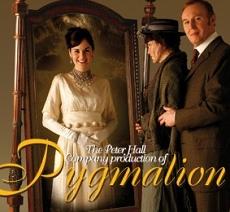Pygmalion Review 2008
Pygmalion was a sculptor from Cyprus who, according to legend, carved an ivory statue of a woman and promptly fell in love with it (or her). Responding to Pygmalion's prayers, the goddess Venus kindly brought the statue to life.
The story of Pygmalion has cropped up throughout the ages in various guises, and George Bernard Shaw saw merit (and, possibly, profit) in the basic concept and brought it to life in his play of the same name which was first produced in 1914 and directed by Shaw himself.
It's a rainy night in Covent Garden. And thanks to the miracles of modern theatrical technology it's also a rainy night on the stage of the Old Vic - with rain that's actually wet and fog to boot. Impressive, but we have seen it before - er, I think on the stage of, yes, the Old Vic. Never mind, if you have some toys in the basement, why not bring them out for an airing once in a while? So, it's a rainy night in Covent Garden in 1912, and everyone is huddled together for shelter. One of them is Eliza Doolittle, a cockney flower seller. Listening to her speaking is one Professor Henry Higgins who is an expert on the way people speak. While Eliza is screeching, he's taking notes about her accent when he comes to the attention of bystanders including one Colonel Pickering who - by sheer coincidence, you understand - is also interested in dialects etc. Well, to cut a long story short, Eliza wants to speak 'proper' so she can get a job in a florist's shop, and Pickering and Higgins decide to bet on whether Higgins can make Eliza pass for a 'toff' within 6 months. Eliza moves into Higgins' home, as does Colonel Pickering, and under the prudent supervision of Higgins' housekeeper, Mrs Pearce, Eiza's accent is modified and then tested in society gatherings.
If this all sounds very familiar, it might well do, because Shaw's 'Pygmalion' was the basis for the immensely popular film 'My Fair Lady'. Successful though that film was, it would not have met with Shaw's approval as the ending was tweaked to include romance blossoming between Higgins and Eliza. An earlier film version (1938) was penned by Shaw himself.
The success of this play rests with the characterisations of Higgins and Eliza, though since it's an ensemble piece, even the minor roles like Mrs Pearce (excellently played here by Una Stubbs) are nonetheless important.
Tim Piggot-Smith seemed almost a perfect Henry Higgins when we first saw him in the comfort of his own home in Wimpole Street. Piggot-Smith's Higgins is a self-centred, heartless bully, with an insensitive, impractical streak about a mile wide. All that as it should be. But when we next saw him at his mother's house, he became almost ridiculously childish. Now I can see the point he was making - Higgins, after all, is a grown-up baby, and gets worse when in the company of his dear old Mum. But, whereas I had believed in Higgins totally in the first two scenes, I began to feel the wave of disbelief waft over me from the stage, giving an uncomfortable sense that Piggot-Smith had gone a little too far. Though I agree that Higgins is a spoilt-brat in a grown-up skin, Piggot-Smith made it a little too blatant to be wholly acceptable.
Michelle Dockery as Eliza Doolittle seemed a little uneasy with her cockney accent in the first few minutes of the opening scene. However, she managed to get her vocal chords back into gear pretty quickly, and produced some of the most memorable acting of the evening. When she's adorned in evening dress and being ignored by Pickering and Higgins after they've flaunted her at a glitzy social gathering, Ms Dockery appears almost as a ghost and, without saying a word, invokes our sympathy. She also excels in the final scene with Higgins where there's a kind of battle of wills which Dockery wins with dignified and gentile aplomb.
In 'Pygmalion' Shaw finds humour in the social order and how classes interact, and criticises middle-class morality through Eliza's father, Alfred. But 'Pygmalion' is also about gender issues. Henry Higgins is a man who's never grown up, doesn't understand anything about women, and actually very little about himself. Colonel Pickering can almost be classed in the same category, except that he's a bit more polite to the opposite sex. Alfred Doolittle is only interested in getting drunk and generally being as irresponsible as possible, and is quite willing to sell his daughter if it gets him a few quid to buy booze and get drunk. Salvation in Shaw's world seems to lie with women who are stronger, more sensible, and far more realistic than men. Not much seems to have changed over the past hundred years or so!
Shaw's play has a charm and appeal that is undiminished with the passage of time. The linguistic humour is still wittily sharp, and Peter Hall's fine revival (with impressive sets by Simon Higlett) is faithful to Shaw's vision - particularly in terms of the unromantic ending. There's no hint here that Higgins and Eliza will ever get hitched, and every indication that, in redefining her social status, Eliza remains very much her own woman.
What the popular press had to say.....
NICHOLAS DE JONGH for THE EVENING STANDARD says, "Thought-provoking production...Sir Peter opts for an uncharacteristically traditional production, with longish pauses between acts." MICHAEL BILLINGTON for THE GUARDIAN says, "Marvellous production...the joy of the evening is that a great play has been faithfully restored reminding us that Shaw's intellectual vitality masked a real sense of life's comedy and pain." BENEDICT NIGHTINGALE for THE TIMES says, " A production that remains pretty irresistible."
External links to full reviews from popular press
The Guardian
The Times
Originally published on
